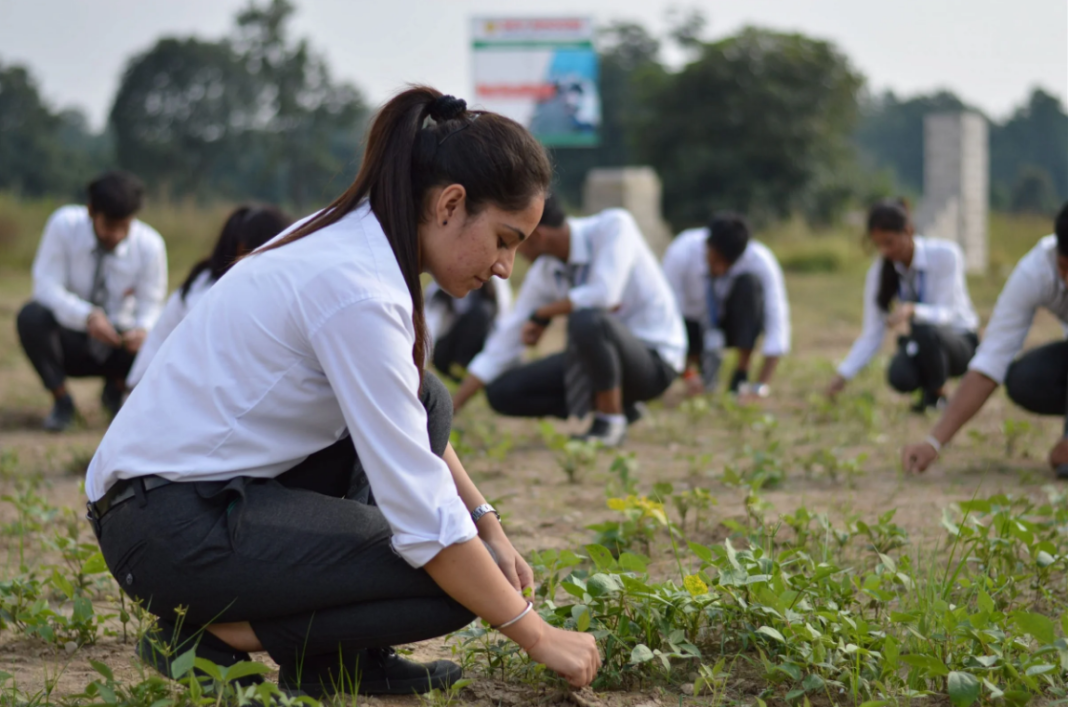Agriculture, one of the oldest professions in human history, is undergoing a technological revolution. Traditional farming methods are being replaced with Smart Agriculture—a tech-driven approach that integrates Artificial Intelligence (AI), Internet of Things (IoT), drones, and data analytics to optimize productivity and sustainability.
As the global population grows and environmental challenges intensify, Smart Agriculture emerges as a solution to ensure food security while preserving natural resources. A B.Sc. in Agriculture equips students with the knowledge, skills, and hands-on experience to excel in this evolving field, making it a valuable program for future agricultural innovators.
What is Smart Agriculture?
Smart Agriculture, also known as precision agriculture, leverages advanced technologies to enhance farming practices. Its focus is on improving efficiency, reducing waste, and increasing yields while minimizing environmental impact.
Key Technologies in Smart Agriculture:
- Drones: Monitor crop health and provide aerial imagery for precision planning.
- IoT Sensors: Measure soil moisture, nutrient levels, and environmental conditions in real time.
- AI and Machine Learning: Analyze data to predict yields, detect pests, and optimize resource use.
- Big Data Analytics: Process large datasets to uncover patterns and trends for better decision-making.
- Robotics: Automate planting, weeding, and harvesting tasks.
These advancements are revolutionizing farming, making it more resource-efficient and sustainable.
How a B.Sc. Agriculture Prepares Students for Smart Agriculture
1. Curriculum Integrating Technology and Traditional Knowledge
Modern B.Sc. Agriculture programs blend foundational agricultural knowledge with cutting-edge technology. Students learn the scientific principles behind farming while gaining practical expertise in emerging tools and techniques.
At Haridwar University, the curriculum includes:
- Precision Farming: Understanding how to apply IoT sensors and AI in managing crop growth.
- Sustainable Agriculture: Training in eco-friendly farming techniques that align with technological practices.
- Agri-Tech Tools: Learning to use tools like GIS for mapping and drones for crop monitoring.
This combination ensures students are well-equipped to work in both conventional and technology-driven farming environments.
2. Hands-On Experience Through Fieldwork
Smart Agriculture is as much about practical application as it is about theoretical knowledge. A B.Sc. in Agriculture offers extensive opportunities for hands-on learning through experimental farms and fieldwork.
Practical Learning Highlights at Haridwar University:
- Students use IoT-enabled devices to monitor soil quality and optimize irrigation schedules.
- Drone-based projects allow students to map fields and assess crop health.
- Fieldwork includes creating sustainable farming solutions using AI-powered tools.
By working on real-world problems, students gain invaluable experience that prepares them for careers in agri-tech and beyond.
3. Exposure to Industry Innovations
The agriculture industry is constantly evolving, with new technologies emerging every year. A robust B.Sc. Agriculture program introduces students to the latest advancements and prepares them to adopt and adapt these technologies effectively.
At Haridwar University:
- Students participate in workshops on AI and robotics applications in agriculture.
- Industry collaborations provide internships with leading agri-tech companies.
- Guest lectures from experts offer insights into future trends like blockchain in food traceability and vertical farming.
These initiatives ensure that graduates are not only familiar with current technologies but are also adaptable to future innovations.
4. Research Opportunities
A strong emphasis on research allows students to explore innovative solutions to modern agricultural challenges.
Research Areas Include:
- Developing climate-resilient crops using genetic analysis and AI.
- Using data analytics to predict pest outbreaks and optimize pesticide use.
- Experimenting with low-cost IoT devices to help small-scale farmers adopt precision farming techniques.
Haridwar University’s Agricultural Research Center has been instrumental in producing impactful student-led projects, such as designing AI algorithms for automated irrigation and weather forecasting systems tailored for Indian farming conditions.
5. Bridging the Gap Between Technology and Farmers
While the potential of Smart Agriculture is vast, its implementation requires skilled professionals who can bridge the gap between technology developers and farmers.
Role of Agriculture Graduates:
- Educating farmers about the benefits of smart tools like automated irrigation and pest control systems.
- Simplifying complex technologies for practical on-ground use.
- Advocating for sustainable and tech-based practices to increase productivity and profitability.
Through community outreach programs, Haridwar University students actively engage with local farming communities, helping them embrace technology to improve outcomes.
Why Smart Agriculture Matters for the Future
The importance of Smart Agriculture cannot be overstated. It addresses critical global challenges such as:
- Population Growth: Feeding a global population projected to reach 9.7 billion by 2050.
- Climate Change: Adapting to unpredictable weather patterns and reducing greenhouse gas emissions.
- Resource Scarcity: Optimizing the use of water, fertilizers, and other inputs.
Future trends include vertical farming in urban areas, blockchain for transparent supply chains, and fully automated farms. A B.Sc. Agriculture graduate is poised to play a pivotal role in these developments.
Why Haridwar University is the Ideal Choice
Haridwar University’s B.Sc. Agriculture program offers a unique blend of academic rigor, hands-on learning, and industry exposure.
Program Highlights:
- Smart Agriculture Labs: Equipped with the latest technology, including drones, IoT devices, and AI software.
- Collaborative Projects: Partnerships with tech companies for student internships and research.
- Experienced Faculty: Mentors with expertise in sustainable farming and technology integration.
- Holistic Development: Training in communication and entrepreneurship to ensure graduates are industry-ready.
“Haridwar University’s program empowers students to innovate and lead in the rapidly evolving agricultural landscape,” says Dr. Devrat, Head of the Agriculture Department.
Conclusion
The future of farming lies in Smart Agriculture, where technology meets tradition to solve global challenges. A B.Sc. in Agriculture equips students with the tools to drive this transformation, opening doors to impactful and rewarding careers.
At Haridwar University, students not only learn the science behind farming but also master the technologies shaping its future. If you’re passionate about making a difference in agriculture, now is the time to embrace this opportunity and be part of the revolution.




